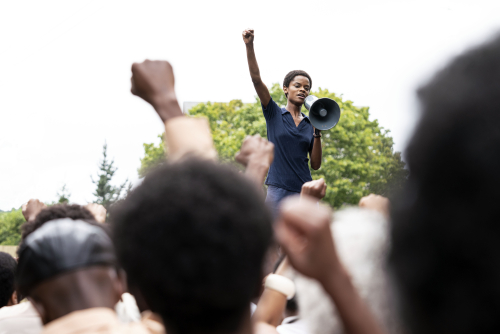
Des Willie/The BFI London Film Festival
MOVIE REVIEW
Mangrove (2020)
“Mangrove” is a beautifully made film directed by an experienced auteur who has finally gotten the perfect marriage of his interests and material, and which also speaks directly to the zeitgeist. It is a deeply unusual experience for something so well made to also be so right for the current moment. But everything Steve McQueen has made has built to telling the true story of the Mangrove Nine, and my god, he does it justice.
In 1968 Frank Crichlow (Shaun Parkes) has cleaned up his professional act and opened a small West Indian restaurant. Notting Hill, the famously posh west London district, back then was the ghetto – it was one of the very few parts of London where landlords would rent to black tenants, mainly because it was still flattened from World War II bomb damage and only starting to recover. While the landlords might have appreciated the changes, the structure of the city – as personified by the local beat cops – certainly did not. Because Mangrove was a successful, happy business, the attempts to shut it down were sustained, co-ordinated and relentless. Frank knows he can stand up to the cops, the local government and the food standards people because he has friends, most importantly public intellectual Darcus Howe (Malachi Kirby), Howe’s partner, Barbara Beese (Rochenda Sandall), and Black Panther Altheia Jones-Lecointe (Letitia Wright). In 1970, after years of this baseless harassment, a march in support of Mangrove is organized. The march becomes violent, the police arrest everybody, and suddenly their freedom is on the line.
Mr. McQueen has learned from the mistakes he made in “Hunger,” in which only his Catholic characters had names, and ensured that the enemy – most notably P.C. Pulley (Sam Spruell) – are given full selves and the chance to articulate their hateful beliefs. But what he is most interested in exploring are the different methods with which the Nine stand up for themselves. Beese is their anger – a mixed-race woman who was not allowed to be adopted due to her blackness, she has enough moxie to carry an actual pig’s head at the rally; and Ms. Sandall does a terrific job of showing the hurt and pain which fuels her rage. Howe is their words – the astounding speech Mr. Kirby gives from the dock is verbatim from court transcripts, and as the person with the highest public profile at the time of their arrest, Howe was the one with the most to lose. Mr. Kirby does an excellent job of showing how someone outrageously brave and equally intelligent might be able to flourish under such unforgivable pressure. Jones-Lecointe is their strategy – the Black Panthers never had a large presence in Britain, but we first see her attempting to unionize a factory with an all-Indian workforce, and it’s her ideas which drive the case in the direction it takes. But Frank is their heart, and the movie never lets us forget it. A beautiful sequence early on shows how a warm day and the decision to throw an impromptu barbecue outside the Mangrove turns into a large, delightful street party. It’s reinforced time and again how important the Mangrove is to the community as a home from home. And it’s Frank the movie follows the most closely, as the court case twists and turns and the police keep a beady watch on him wherever he goes.
“Human Traffic” was a beloved middle-class “Trainspotting” knockoff from 1999 about the lost weekend of five club kids, and it was as one of those five that Mr. Parkes had his only previous major leading role in British cinema. It is British cinema’s loss. He is a deeply sympathetic leading man, charming and handsome, which makes Frank’s ongoing commitment to passive resistance and resigned acceptance of the constant need to start over believable. He is more than a match for Ms. Wright, who is first billed and carries the responsibility with ease. Her cracking intelligence, profound empathy and gorgeous smile make her an obvious leader. People lean in when she talks; the audience does too.
Mr. McQueen is working at the top of his game here, as are his collaborators. Mica Levi, who got huge acclaim for her score for “Under the Skin,” does the music here as well, and brings same appropriate sense of eerie, relentless foreboding. Cinematographer Shabier Kirchner does an astounding job – the movie looks unusually gorgeous, with warm tones radiating (except when they deliberately don’t) mirroring the warmth this community finds from itself. The use of corners, windows and other forced perspectives make the text subtext, too. Production designer Helen Scott, set designer Hannah Spice, and costumer designer Lisa Duncan built a realistic working-class world with faded wallpaper and period clothes that don’t detract from the human drama.
But there is so much drama. In the scene where Mr. Wright stands on a car and addresses the crowd through a megaphone, a lesser director would have made it explicit that the building under construction in the background is Grenfell Tower. Yes, the one in which 72 people burned to death in 2017 for which no justice has yet been served. The horror of that incident shocked the world, just as the murder of George Floyd has. Black Lives Matter signs have appeared in windows across Britain, too. But lest anyone think those signs were aimed at an American audience, there were also many that said “THE UK IS NOT INNOCENT.” If “Mangrove” had been made at any other time, it might have experienced polite interest and then vanished. Right now it is the most important film of the year and an unqualified masterpiece. It cannot be recommended more strongly.
Comments